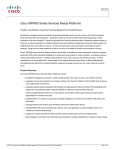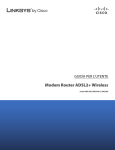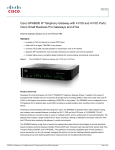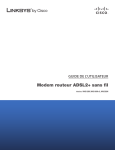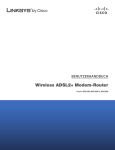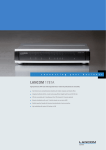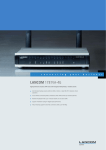Download Cisco SRP521W
Transcript
Data Sheet Cisco SRP 521W Services Ready Platform Flexible, Cost-Effective Customer Premises Equipment for Small Business Part of the Cisco Small Business Pro Series Demand for managed services is expected to grow dramatically over the next four years, with small businesses-those with fewer than 100 employees--expected to make up more than half of this market opportunity. These companies may have complex IT needs but generally don’t have the technical staff or expertise needed to keep up. They look to service providers for a flexible infrastructure and simplified management, along with better quality and reliability than they can achieve in-house. To meet this opportunity, service providers are transforming their networks, using services-ready platforms to deliver an array of profitable IP-based communications services. ® Cisco SRP 500 Series Services Ready Platforms are flexible, cost-effective fixed-configuration customer premises equipment (CPE) with embedded intelligence to enable service providers to create, provision, and deploy premium revenue-generating services--a variety of high-quality IP voice, data, security, wireless, and application services--to small businesses on an as-needed basis. These platforms will help enable service providers to deliver differentiated, converged service offers that increase bandwidth usage and average revenue per user while reducing customer churn. Product Overview The Cisco SRP 521W Services Ready Platform includes: ● Embedded intelligence to support a variety of high-quality voice, data, security, wireless, and application services. ● Integrated voice ports and an industry-leading voice Session Initiation Protocol (SIP) stack to deliver clear, high-quality voice service. ● Integrated stateful packet inspection (SPI) firewall and high-speed IP Security (IPsec) VPN capabilities with support for Triple Data Encryption Standard (3DES) to help keep small business data safe. ● 4-port managed Ethernet switch to connect devices in the office. VLAN support allows for highly secure segmentation of network resources. ● Integrated 802.11n wireless access point to enable employees to connect to the network while away from their desks. ● ● Third-generation (3G) readiness with built-in 3G USB modem drivers. Interoperability with industry-leading soft switches, and voice gateways to enable scalable, end-to-end multiservice network deployments. ● Support for industry-standard TR-069, TR-104, and XML-based provisioning for zero-touch deployments. ● Easy integration with other Cisco Small Business Pro Series products to enable adaptability as customer needs change. Figure 1 shows the Cisco SRP 521W Services Ready Platform. © 2009 Cisco Systems, Inc. All rights reserved. This document is Cisco Public Information. Page 1 of 8 Data Sheet Figure 1. Cisco SRP 521W Services Ready Platform Table 1 lists details of the planned Cisco SRP 521 model. Table 1. Cisco SRP 521 Model WAN Backup WAN LAN Voice Ports USB 2.0 Ports Cisco SRP 521W 10/100 Mbps Fast Ethernet N/A 4 ports 10/100 Mbps Fast Ethernet 2 FXS, 1 FXO (relay) 1 Applications The Cisco SRP 500 Series Services Ready Platforms contain embedded application intelligence to enable service providers to add and/or remove services remotely, depending upon end customer requirements, without hardware upgrades or costly truck rolls. Figure 2 shows the applications that will be embedded. © 2009 Cisco Systems, Inc. All rights reserved. This document is Cisco Public Information. Page 2 of 8 Data Sheet Figure 2. Applications Embedded in the Cisco SRP 500 Series Features and Benefits Cisco SRP 500 Series Services Ready Platforms are flexible, cost-effective CPE devices for small businesses that meet the needs of service providers through: ● Embedded intelligence to support concurrent, premium revenue-generating services such as voice, data, security, and applications. Service providers can easily create and provision a variety of service offerings, adding or removing them remotely as their customers’ needs change ● Industry-leading SIP stack that delivers an advanced implementation of standard voice coding algorithms for clear, high-quality voice under diverse network conditions, along with support for common telephony features such as voicemail, fax, and interactive voice response systems ● Interoperability with industry-leading soft switches, and voice gateways that enable service providers to deploy highly efficient, scalable end-to-end multiservice networks ● Standards-based provisioning, with support for TR-069, TR-104, and XML, that reduces operating expenses by enabling zero touch deployments, eliminating the need for highly skilled technicians and costly truck rolls to deploy new services ● Compact design that integrates voice, data, switching, wireless, security, and application support in a desktop device that is ideal for simple, space-saving small business deployments ● Competitive pricing with support for premium services that reduces capital expenses, warehousing costs, and the need for complete equipment upgrades when service requirements change Product Specifications Table 2 lists the software features of the Cisco SRP 500 Series, Table 3 gives the voice features, and Table 4 describes the wireless features. © 2009 Cisco Systems, Inc. All rights reserved. This document is Cisco Public Information. Page 3 of 8 Data Sheet Table 2. Software Features of the Cisco SRP 500 Series Feature Routing Description ● Static routing ● Routing Information Protocol (RIP) versions 1 and 2 ● Generic routing encapsulation (GRE) ● Layer 2 Tunneling Protocol version 2 (L2TPv2) Data features ● MAC address (IEEE 802.3) ● IPv4 (RFC 791) ● Address Resolution Protocol (ARP) ● DNS A record (RFC 1706), SRV record (RFC 2782) ● Dynamic Host Configuration Protocol (DHCP) client (RFC 2131) ● DHCP server (RFC 2131) ● Point-to-Point Protocol over Ethernet (PPPoE) client (RFC 2516) ● Internet Control Message Protocol (ICMP) (RFC 792) ● TCP (RFC 793) ● User Datagram Protocol (UDP) (RFC 768) ● Real-Time Transport Protocol (RTP) (RFC 1889, RFC 1890) ● Real-Time Control Protocol (RTCP) (RFC 1889) ● Trivial File Transfer Protocol (TFTP) ● Real-Time Streaming Protocol (RTSP) ● HTTP ● Network Address Translation (NAT) (RFC 1631) ● Session Description Protocol (SDP) ● Simple Network Time Protocol (SNTP) (RFC 2030) ● Type of service (ToS) (RFC 791, RFC 1349) ● Quality of service (QoS): packet prioritization by type ● Router or bridge mode of operation ● MAC address cloning ● Port forwarding ● IP multicast; Internet Group Management Protocol (IGMP) versions 1, 2, and 3; IGMP proxy ● Universal Plug and Play (UPnP) ● Dynamic Domain Name System (DDNS) ● DNS proxy ● DNS spoofing ● Access control lists (ACLs) Switch features ● Automatic medium dependent interface (MDI) and MDI crossover (MDI-X) ● Up to 5 802.1Q VLANs Security features ● Secure connectivity ● IPsec VPN ● Storm control ● Hardware-accelerated Data Encryption Standard (DES), 3DES ● 5 IPsec tunnels ● NAT transparency ● Stateful inspection routing firewall ● Stateful inspection transparent firewall ● Secure HTTP (HTTPS) support for remote access ● Password-protected configuration for web access ● Denial-of-service (DoS) prevention ● URL filtering and keyword, Java, ActiveX, proxy, cookie blocking ● VPN pass-through for IPsec, Point-to-Point Tunneling Protocol (PPTP), and L2TP ● 64- and 128-bit Wired Equivalent Privacy (WEP) with pass-phrase WEP key generation ● Service Set Identifier (SSID) broadcast disable ● Access restriction by MAC and IP address ● Wi-Fi Protected Setup (WPS), Wi-Fi Protected Access (WPA), WPA2 ● Security key bits: 64, 128 QoS features ● Weighted Fair Queuing (WFQ) ● Low-Latency Queuing (LLQ) ● Traffic shaping ● Traffic policing; class of service (CoS) to differentiated services code point (DSCP) mapping © 2009 Cisco Systems, Inc. All rights reserved. This document is Cisco Public Information. Page 4 of 8 Data Sheet Provisioning, administration, and maintenance ● TR-069 ● Automated provisioning and upgrade via Cisco XML profile, HTTP, HTTPS ● Asynchronous notification of upgrade availability via NOTIFY ● Web browser administration and configuration via integral web server ● Nonintrusive in-service upgrades ● Report generation and event logging ● Stats in BYE message ● Syslog and debug server records ● Per-line and purpose configurable syslog and debug options ● Simple Network Management Protocol (SNMP) version 2 ● RADIUS support with external server High-availability features Table 3. Automatic failover and recovery of WAN connection enabled with USB mobile broadband modem Voice Features of the Cisco SRP 500 Series Feature Voice gateway Description ● SIP version 2 (RFC 3216) ● Sending SIP messages via UDP/TCP ● Echo cancellation (G.167 and G.168) ● Dynamic jitter buffer ● Simple traversal of UDP through NAT Serial Tunnel (STUN) (RFC 3489) ● SDP (RFC 2327) ● RTP/ RTCP over UDP ● 3-way conferencing ● Remote firmware upgrade ● Dual-tone multifrequency (DTMF) tone detection and generation ● Voice activity detection (VAD) ● Silence suppression ● Comfort noise generation (CNG) ● Caller ID generation and detection (frequency shift keying [FSK] and DTMF) ● Media loopback ● SIP Transport Layer Security (TLS) ● SIP channels support both UDP and TCP transport ● Support for 2 simultaneous T.38 or G.729 calls ● T.38 fax relay, including V.17, V.21, V.27ter, and V.29 and fax pass-through (pulse code modulation [PCM]) (T.38 support is dependent on fax machine and network/transport resilience) International Telecommunications Union (ITU) standard voice codecs Voice algorithms ● G.711 (a-law and µ-law) ● G.726 (16/24/32/40 kbps) ● G.729 AB ● G.723.1 (6.3 kbps, 5.3 kbps) Telephony interface signaling support ● Ring voltage: 40 to 90 Vpk ● Ring frequency: 20 to 25 Hz ● Ring waveform: trapezoidal with 1.2 to 1.6 crest factor ● Maximum ringer load: 3 ringer equivalence numbers (RENs) ● On-hook/off-hook characteristics: ◦ On-hook voltage (tip/ring): -46 to -56V ◦ Off-hook current: 18 to 20 mA ◦ Terminating impedance: 600 ohm resistive ◦ 270 ohm + 750 ohm//150 nF complex impedance ◦ Frequency response: 300 to 3400 Hz © 2009 Cisco Systems, Inc. All rights reserved. This document is Cisco Public Information. Page 5 of 8 Data Sheet ● Call forwarding: no answer/busy/unconditional ● Support for 2 simultaneous calls Voice features ● SIP TLS ● Call transfer ● Call waiting/hold/retrieval ● Three-way conferencing ● Caller ID number and name (primary line and on call waiting) ● Caller ID block (prevents sending out the caller ID) ● Anonymous call blocking ● Distinctive ringing ● Do not disturb setting ● Repeat dialing on busy ● Call return ● Emergency call support ● Dial plan ● Speed dial ● Auto-attendant ● Meet-me conference Voice port interfaces Support FXS and FXO (relay) ● Fax and modem pass-through: Allows fax and modem traffic to pass through a voice port. ● Fax relay: Provides a more robust protocol for fax transmission over packet networks. Also supports the T.38 fax protocol. Fax and modem Table 4. Wireless Features of the Cisco SRP 500 Series Feature Description ● Wi-Fi 802.11b/g/n ● WPA and WPA2 WLAN hardware ● Wi-Fi Multimedia (WMM) ● Default antenna gain: 2.2 dBi ● WPS button ● 802.11i ● WPA and Advanced Encryption Standard (AES) (WPA2) WLAN security features ● Static and dynamic WEP ● Temporal Key Integrity Protocol/Simple Security Network (TKIP/SSN) encryption ● MAC authentication/filter ● Configurable RADIUS authentication for wireless clients ● Pre-Shared Keys (PSK) SSIDs 4 System Specifications Table 5 lists the system specifications for the Cisco SRP 521. Table 5. System Specifications for the Cisco SRP 521W Feature Description Default DRAM 64 MB Default flash memory 32 MB WAN Fast Ethernet LAN switch Managed 4-port 10/100BASE-T with autosensing MDI/MDI-X for automatic crossover 802.11b/g/n WLANs Integrated USB 2.0 ports 1 port LEDs Power, WAN, Wi-Fi, phone, LAN, WPS External power supply Universal 100 to 240 VAC Approvals and compliance Class B © 2009 Cisco Systems, Inc. All rights reserved. This document is Cisco Public Information. Page 6 of 8 Data Sheet Certifications Wi-Fi certified Regulatory Compliance Safety ● IEC 60950-1 ● AS/NZS 60950.1 ● CAN/CSA-C22.2 No. 60950-1 ● EN 60950-1 ● UL 60950-1 Immunity ● EN 55024 ● EN 300-386 ● EN 61000-6-2 ● EN 50082-1 ● EN 55024 (CISPR 24) EMC ● FCC Part 15, ICES-003 ● EN55022, CISPR 22 ● EN 300-386 ● EN 61000-3-2 ● EN 61000-3-3 ● EN 50082-1 ● EN 55024 ,CISPR 24 ● EN 61000-4-2 ● EN 61000-4-3 ● EN 61000-4-4 ● EN 61000-4-5 ● EN 61000-4-6 ● EN 61000-4-8 ● EN 61000-4-11 RF EMC ● CFR47 part15.247 ● RSS-210 Rev 5 ● ETSI EN 300.328.1 ● ETSI EN301.489.1& .17 ● AS./NZS 4268 TELCOM ● TIA-968 ● CS-03 ● ACIF S002 ● ACIF S003 ● ACIF S043 ● ANZ PTC200 ● ANZ PTC220 ● ANZ PTC273 ● TBR21 Environmental operating range ● Operating temperature: 32 to 104°F (0 to 40°C) ● Non-operating temperature: -22 to 158ºF (-30 to 70ºC) ● Operating humidity: 5 to 95% non-condensing ● Noise level (max): silent ● On premise only, restricted access area, permanent ground required, only to be serviced/installed by trained professionals. Cisco Services As part of the Cisco Small Business Pro Series, the Cisco SRP 500 Series Services Ready Platforms are supported by professionals in Cisco Small Business Support Center locations worldwide who are specifically trained to understand small businesses. The Cisco Small Business Support Community, an online forum, enables small business customers to collaborate with their peers to get answers and solve problems. © 2009 Cisco Systems, Inc. All rights reserved. This document is Cisco Public Information. Page 7 of 8 Data Sheet Printed in USA © 2009 Cisco Systems, Inc. All rights reserved. This document is Cisco Public Information. C78-550705-00 11/09 Page 8 of 8









